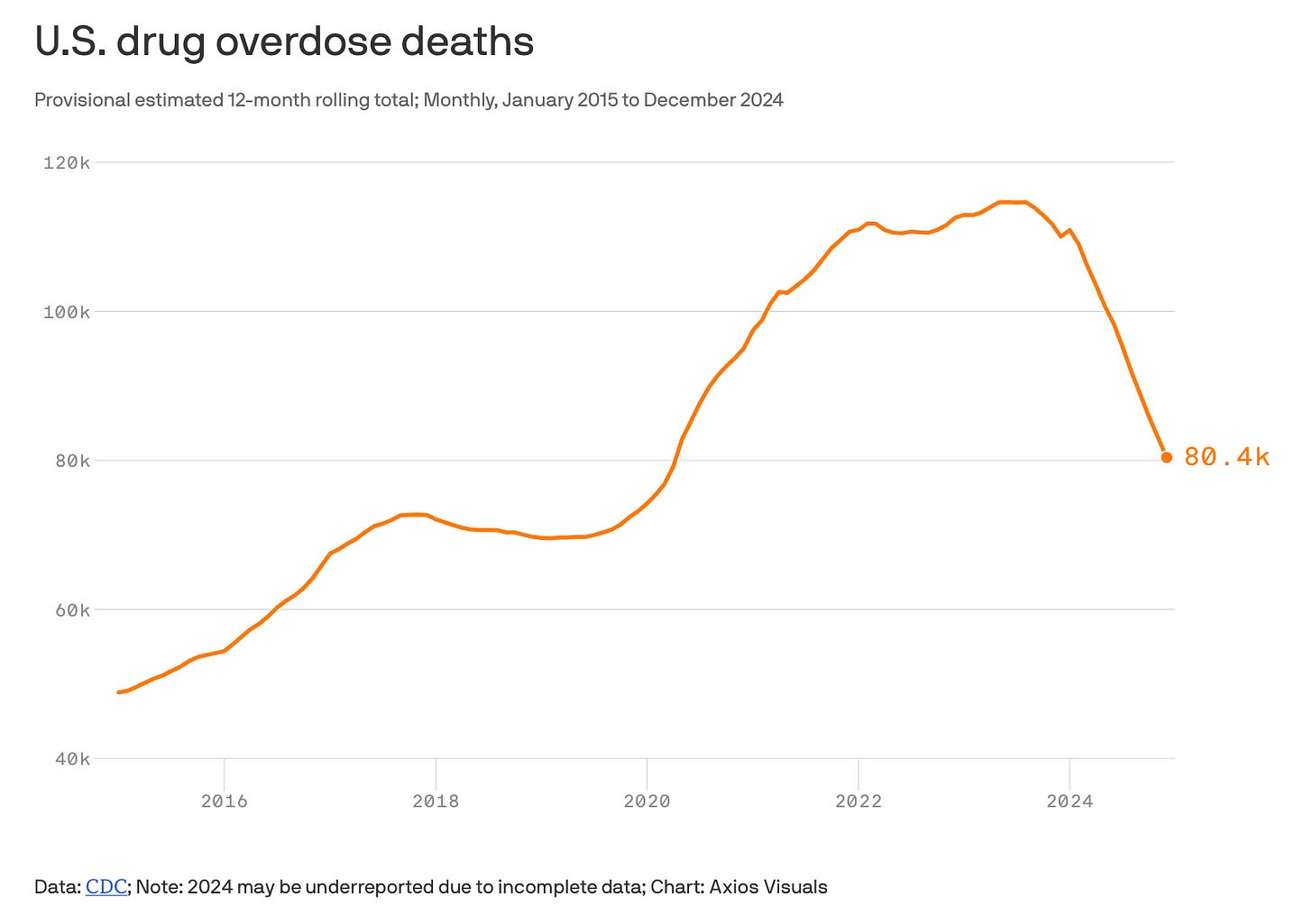Weekly Progress Roundup
Doctors cure infant using gene therapy, drug overdose deaths fall, rare minerals keep turning up, and more.
Energy & Environment
Conservation and biodiversity
Thanks to warming temperatures, a new type of bee has settled in England that is better at pollinating than the honeybee.
Natural Resources
There are 4.5 billion tons of uranium floating around the Earth's oceans, enough to power human civilization for millennia. A new electrochemical process can tap that supply at a cost of $83 per kilogram, half the price of previous methods.
On Tuesday, just a few months after China imposed export controls on indium—an important ingredient in solar panels and semiconductors—the mineral exploration company Earth AI announced the discovery of a rich deposit in Australia.
Pollution
It’s been sunnier than usual in much of East Asia this year, thanks to favorable weather and falling air pollution.
Health & Demographics
Doctors in Philadelphia used a personalized gene therapy to cure an infant with a rare and often fatal genetic disorder—a world first. Within six months of the child’s diagnosis, the team designed and administered an infusion capable of precisely correcting the mutation responsible for the disease in each affected cell.
The number of US newborns hospitalized for respiratory syncytial virus (RSV) has fallen by half since 2018. The CDC credits a new RSV vaccine and monoclonal antibody treatment that protect infants from the disease.
The Indian state of Kerala saw a 70 percent drop in rheumatic fever cases between 2019 and 2024, blowing the WHO target of a 25 percent reduction out of the water.
Indonesia’s childhood stunting rate fell from 30 percent in 2018 to 21.5 percent in 2023 alongside rising access to adequate nutrition.
The pharmaceutical company Stablepharma has begun a clinical trial for a tetanus-diphtheria vaccine that remains stable at temperatures up to 40°C (104°F), eliminating the need for refrigeration. This is a big deal: The WHO estimates that around half of all vaccines produced go to waste, mostly due to cold chain failures.
According to CDC data, annual US drug overdose deaths fell by a stunning 26.9 percent between 2023 and 2024, though deaths were still higher than before the pandemic.
Science & Technology
The self-driving taxi company Waymo is scaling up production, with plans to more than double the size of its robotaxi fleet by next year with the help of a new factory in Phoenix.
Apple and Synchron have teamed up to make the iPhone, iPad, and Vision Pro headset compatible with Synchron’s brain-computer interface. Soon, anyone with a Synchron implant may be able to operate these devices with only their thoughts.
Using the James Webb Space Telescope, astronomers have captured the deepest wide-field image of the universe to date, covering 0.54 square degrees of the heavens—the area of three full moons—and revealing galaxies as they appeared just a few hundred million years after the Big Bang.
Large language models can now independently and reliably complete tasks that take humans 20 minutes or more. Before 2023, they were limited to tasks that take people around 10 seconds.
Violence & Coercion
A recent Op-Ed in the Washington Post highlights some unusually hopeful facts about US mass shootings:
As of May 10, there have been four shootings in the United States in which four or more victims died this year, compared with 11 at the same juncture last year. It’s the lowest incident count over the first four months of a year since at least 2006, when researchers started the Mass Killing Database…
The drop underscores an often-misunderstood fact about deadly mass shootings: They have not skyrocketed over the past couple of decades, especially considering the growth in population.
Selected essays
Luis Garicano summarizes the hidden costs of trading within the European Union.
Stephen McBride illustrates how drones are revolutionizing logistics.
Unlike much of our physical infrastructure, cruise ships continue to grow.








